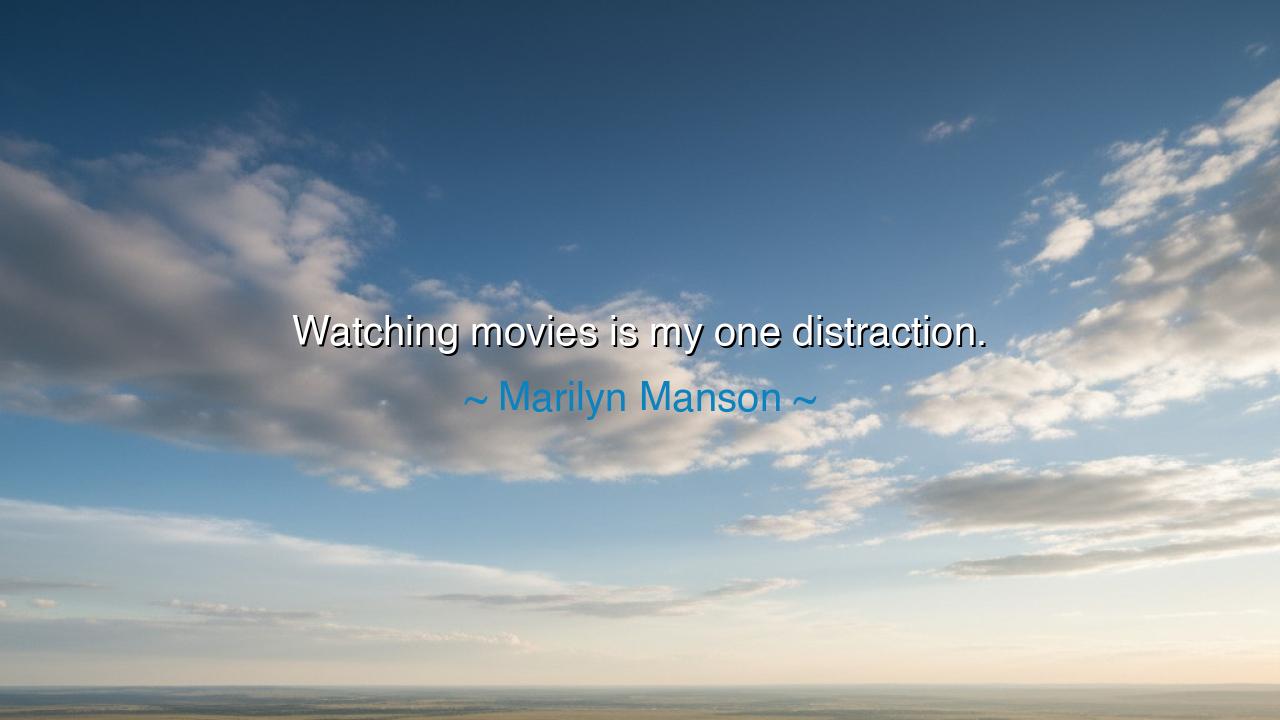
Watching movies is my one distraction.






Hear now the words of Marilyn Manson, a figure of provocation and paradox, whose voice has long echoed in the chambers of art and rebellion. He declares with simplicity: “Watching movies is my one distraction.” Though the utterance seems plain, it hides within it the wisdom of a restless soul, one who finds little solace in the world, save in the shadows and lights that dance upon a screen. In this, he speaks not only for himself, but for all who seek a refuge where imagination reigns, and where the burdens of reality may, for a brief time, be set aside.
To call movies a distraction is to reveal their sacred role as portals. For Manson, whose art is filled with the grotesque and the extreme, the cinema offers balance. There, the chaos he often embodies can be stilled, and he may become a watcher, not the one watched. This act of turning from creator to spectator is an ancient rhythm—like the warrior who lays down his sword at the fire to listen to a bard’s tale. Even the fiercest spirit must rest, and in the moving images of cinema, Manson finds the softening of his storm.
We see echoes of this truth in the life of Winston Churchill. During the harrowing years of the Second World War, when the weight of nations pressed upon his shoulders, he sought respite not in war councils alone but in painting. For him, colors upon canvas were the same as movies for Manson—a distraction, yes, but more than that, a preservation of the soul. These moments of diversion, far from weakness, gave strength for the greater battles. Thus, even the mightiest leaders and artists must seek the quiet sanctuaries of the mind.
Yet Manson’s words remind us also of the dual nature of distraction. For though it may be seen as escape, it is also medicine. The mind cannot endure ceaseless intensity, nor the heart constant burden. To watch a movie is not to abandon reality, but to allow the spirit a breathing space, where sorrow can be soothed, joy rekindled, and new visions awakened. The shadows on the screen become companions, teaching us truths in disguise, just as myths once taught lessons by firelight.
There is also humility here. Manson, often painted as larger than life, admits to a simple pleasure shared by millions. In this confession, the veil of performance falls, and the human being beneath is revealed. The artist, who has himself been a spectacle, turns to the spectacles of others for comfort. In this, we are reminded that no matter how great or infamous one may seem, the heart still longs for common joys—the warmth of story, the pull of imagination, the gentle hand of distraction.
The lesson for us, then, is clear: honor your distractions, for they are not enemies but guardians. Let them not consume you, but let them restore you. Just as the body requires sleep, the spirit requires moments of wandering, where it may drift into dreams not its own. Find your movie, your painting, your song, your walk beneath the trees, and let it carry you away, that you may return renewed.
Therefore, beloved listener, do not scorn the humble refuge of distraction. For within it lies the strength to face the greater labors of life. Seek the diversions that lift you rather than bind you, that illuminate rather than numb. And when the world presses heavily, as it did upon Churchill, as it does upon Manson, retreat for a time into your sanctuary. For from such rest, you will rise again, steadier, stronger, and ready to continue the work of your days.
Thus, from a short sentence, a great truth emerges: even the fiercest of spirits must step aside from the storm, and in the shadows of a movie, find a place where the soul can breathe.






AAdministratorAdministrator
Welcome, honored guests. Please leave a comment, we will respond soon